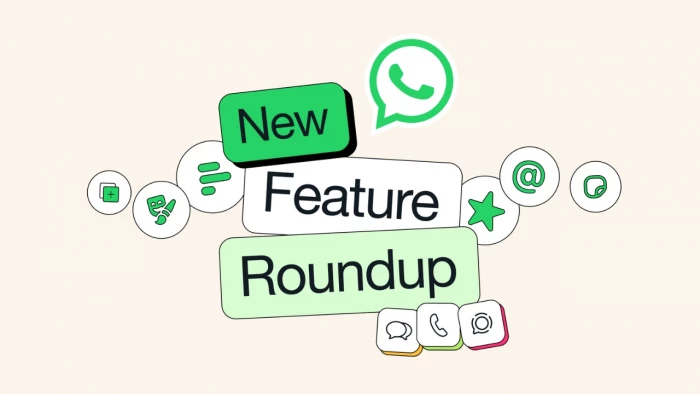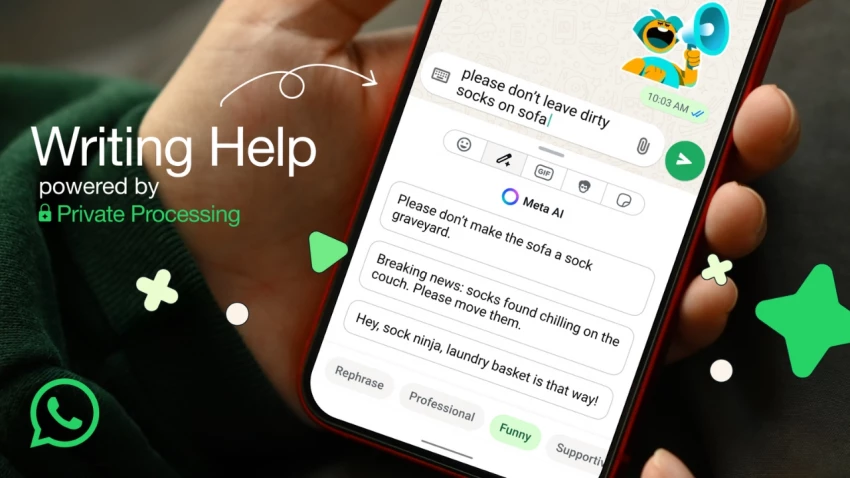WhatsApp Introduces AI Writing Help Feature for Rephrasing and Tone Adjustment
by Vaishali - 5 months ago - 6 min read

WhatsApp’s New Experiment With AI Messaging
WhatsApp, the world’s largest messaging app with more than 2.7 billion monthly active users, has begun testing an AI-powered tool called Writing Help. The feature allows users to rephrase their messages and adjust tone directly inside the app.
Unlike previous upgrades focused on design or security, this addition introduces artificial intelligence into the heart of daily conversations. With competitors like Google Messages and Telegram experimenting with AI integrations, WhatsApp’s move signals a broader industry trend.
How the Writing Help Tool Works
The feature appears as a pencil icon in the chat box. After drafting a message, users can tap the icon to generate alternative phrasings. The AI offers five main styles:
- Professional – Polished, formal language suited for workplace chats.
- Funny – Lighthearted rewrites that add humor to otherwise plain text.
- Supportive – Softer and more empathetic tones for sensitive conversations.
- Rephrase – Simplified or clearer versions of a message.
- Proofread – Corrected grammar, punctuation, and spelling.
For example, the sentence “Don’t leave dirty socks on the sofa” may be rephrased into:
- “Please don’t make the sofa a sock graveyard.”
- “Breaking news: Socks found chilling on the couch. Please move them.”
- “Hey, sock ninja, the laundry basket is that way!”
The tool is designed for in-app convenience, removing the need to copy text into external apps like Grammarly or ChatGPT.
Privacy and Data Protection
Meta, WhatsApp’s parent company, emphasizes that the feature uses private processing. This means:
- Messages are encrypted and anonymized before being processed.
- Text is not stored on Meta’s servers after suggestions are generated.
- Users must opt in by enabling the feature under Settings → Chats → Private Processing.
The company has clarified that Writing Help is off by default, addressing long-standing concerns about WhatsApp’s data-sharing practices. Privacy experts note that making the feature optional is crucial, given Meta’s history of regulatory scrutiny in the EU and India.
Dr. Angela Pappas, a digital privacy researcher at the University of Amsterdam, said:
“Meta’s opt-in model shows awareness of privacy sensitivities. The challenge will be ensuring users trust that their messages are not retained for model training.”
Limited Rollout and Early Access
Currently, Writing Help is available only in English and in select regions, including the United States. WhatsApp has not confirmed exact numbers, but reports suggest the rollout covers a limited testing group before broader availability later in 2025.
Industry trackers note that this mirrors WhatsApp’s cautious approach to other major updates, such as multi-device login and end-to-end encrypted backups, which rolled out in phases over several months.
The AI Arms Race in Messaging
WhatsApp is not alone in embedding AI into messaging. Competitors have also made similar moves:
- Google Messages has integrated Gemini-powered smart replies and contextual suggestions.
- Telegram has introduced AI chatbots for inline assistance.
- WeChat in China uses AI for smart replies, voice transcription, and business interactions.
Tom Warren, senior tech analyst at The Verge, commented:
“Meta is under pressure to keep WhatsApp competitive. If Google bakes AI deeply into Android messaging, WhatsApp risks losing relevance, particularly among younger users.”
By placing AI directly inside WhatsApp’s chat interface, Meta reduces reliance on external apps and keeps users engaged within its ecosystem.

Comparisons With Grammarly and ChatGPT
While Writing Help overlaps with tools like Grammarly or ChatGPT, its design differs:
- Scope – Grammarly focuses on long-form writing and email, while WhatsApp’s AI targets short, conversational text.
- Accessibility – ChatGPT requires switching apps; WhatsApp integrates editing within chats.
- Control – WhatsApp’s model prioritizes quick tone adjustment rather than creative generation.
In practice, Writing Help functions more like a built-in style assistant than a full AI chatbot.
Potential Benefits for Users
Analysts see several practical benefits:
- Improved workplace communication – Users can adjust tone for professional interactions.
- Language support – Non-native English speakers can improve clarity without external apps.
- Social flexibility – Tone-switching (e.g., supportive or funny) helps avoid miscommunication.
- Time savings – Instead of drafting multiple versions, users get instant alternatives.
A survey by Statista in 2024 found that 62% of messaging app users worried about tone being misinterpreted in text. Writing Help could reduce these issues.
Risks and Concerns
Despite the advantages, experts highlight challenges:
- Over-reliance on AI – Users may lose natural voice and authenticity in conversations.
- Cultural bias – AI-generated suggestions may not always align with local humor or norms.
- Privacy doubts – Even with private processing, skepticism remains about Meta’s handling of data.
- AI errors – Misphrased suggestions could cause confusion or unintended offense.
Michael Tan, communications professor at NYU, noted:
“AI can smooth communication, but it also risks flattening personal expression. Conversations may start sounding automated if users rely too heavily on these features.”
Regulatory Considerations
Meta’s rollout of AI inside WhatsApp is likely to attract regulatory attention, particularly in the European Union, where the AI Act sets strict rules on transparency. The Indian IT Ministry, which oversees digital platforms for nearly 500 million WhatsApp users, may also review whether AI suggestions meet data protection standards.
Priya Singh, policy analyst at Digital Rights India, said:
“Meta must provide clear assurances that Writing Help won’t evolve into a data collection pipeline. India has seen increasing scrutiny of AI tools, especially those tied to foreign corporations.”
The Bigger Picture: Messaging and AI Convergence
The integration of AI into WhatsApp represents a broader shift in digital communication. Messaging platforms are evolving from simple text carriers into smart communication hubs. Features like Writing Help point to a future where AI mediates not just grammar, but intent, tone, and cultural nuance.
Market research firm Gartner predicts that by 2027, over 50% of personal and workplace digital communication will be AI-assisted in some form. WhatsApp’s adoption of Writing Help reflects that trajectory.
Conclusion
WhatsApp’s Writing Help is a modest but significant step toward embedding AI in everyday communication. By offering rephrasing and tone adjustments directly inside chats, the tool addresses common frustrations around clarity and tone while raising new questions about privacy, authenticity, and reliance on technology.
For now, the feature remains experimental, limited in rollout, and optional. But as AI becomes inseparable from digital communication, WhatsApp’s move could set a new standard for how billions of people craft their daily messages.